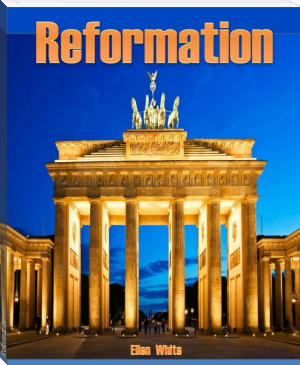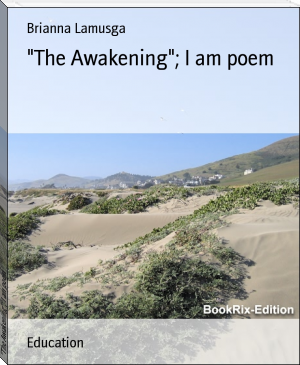Reformation - Ellen G. White (you can read anyone TXT) 📗

- Author: Ellen G. White
Book online «Reformation - Ellen G. White (you can read anyone TXT) 📗». Author Ellen G. White
In the sixteenth century the Reformation, presenting an open Bible to the people, had sought admission to all the countries of Europe. Some nations welcomed it with gladness, as a messenger of Heaven. In other lands the papacy succeeded to a great extent in preventing its entrance; and the light of Bible knowledge, with its elevating influences, was almost wholly excluded. In one country, though the light found entrance, it was not comprehended by the darkness. For centuries, truth and error struggled for the mastery. At last the evil triumphed, and the truth of Heaven was thrust out. "This is the condemnation, that light is come into the world, and men loved darkness rather than light." John 3:19. The nation was left to reap the results of the course which she had chosen. The restraint of God's Spirit was removed from a people that had despised the gift of His grace. Evil was permitted to come to maturity. And all the world saw the fruit of willful rejection of the light.
The war against the Bible, carried forward for so many centuries in France, culminated in the scenes of the Revolution. That terrible outbreaking was but the legitimate result of Rome's suppression of the Scriptures.It presented the most striking illustration which the world has ever witnessed of the working out of the papal policy-- an illustration of the results to which for more than a thousand years the teaching of the Roman Church had been tending. The suppression of the Scriptures during the period of papal supremacy was foretold by the prophets; and the Revelator points also to the terrible results that were to accrue especially to France from the domination of the "man of sin."
Said the angel of the Lord: "The holy city shall they tread underfoot forty and two months. And I will give power unto My two witnesses, and they shall prophesy a thousand two hundred and threescore days, clothed in sackcloth. . . . And when they shall have finished their testimony, the beast that ascendeth out of the bottomless pit shall make war against them, and shall overcome them, and kill them. And their dead bodies shall lie in the street of the great city, which spiritually is called Sodom and Egypt, where also our Lord was crucified. . . . And they that dwell upon the earth shall rejoice over them, and make merry, and shall send gifts one to another; because these two prophets tormented them that dwelt on the earth. And after three days and a half the Spirit of life from God entered into them, and they stood upon their feet; and great fear fell upon them which saw them." Revelation 11:2-11.
The periods here mentioned--"forty and two months," and "a thousand two hundred and threescore days"--are the same, alike representing the time in which the church of Christ was to suffer oppression from Rome. The 1260 years of papal supremacy began in A.D. 538, and would therefore terminate in 1798. (See Appendix note for page 54.) At that time a French army entered Rome and made the pope a prisoner, and he died in exile. Though a new pope was soon afterward elected, the papal hierarchy has never since been able to wield the power which it before possessed.
The persecution of the church did not continue throughout the entire period of the 1260 years. God in mercy to His people cut short the time of their fiery trial. In foretelling the "great tribulation" to befall the church, the Saviour said: "Except those days should be shortened, there should no flesh be saved: but for the elect's sake those days shall be shortened." Matthew 24:22. Through the influence of the Reformation the persecution was brought to an end prior to 1798.
Concerning the two witnesses the prophet declares further: "These are the two olive trees, and the two candlesticks standing before the God of the earth." "Thy word," said the psalmist, "is a lamp unto my feet, and a light unto my path." Revelation 11:4; Psalm 119:105. The two witnesses represent the Scriptures of the Old and the New Testament. Both are important testimonies to the origin and perpetuity of the law of God. Both are witnesses also to the plan of salvation. The types, sacrifices, and prophecies of the Old Testament point forward to a Saviour to come. The Gospels and Epistles of the New Testament tell of a Saviour who has come in the exact manner foretold by type and prophecy.
"They shall prophecy a thousand two hundred and three-score days, clothed in sackcloth." During the greater part of this period, God's witnesses remained in a state of obscurity. The papal power sought to hide from the people the word of truth, and set before them false witnesses to contradict its testimony.When the Bible was proscribed by religious and secular authority; when its testimony was perverted, and every effort made that men and demons could invent to turn the minds of the people from it; when those who dared proclaim its sacred truths were hunted, betrayed, tortured, buried in dungeon cells, martyred for their faith, or compelled to flee to mountain fastnesses, and to dens and caves of the earth--then the faithful witnesses prophesied in sackcloth. Yet they continued their testimony throughout the entire period of 1260 years. In the darkest times there were faithful men who loved God's word and were jealous for His honour. To these loyal servants were given wisdom, power, and authority to declare His truth during the whole of this time.
"And if any man will hurt them, fire proceedeth out of their mouth, and devoureth their enemies: and if any man will hurt them, he must in this manner be killed." Revelation 11:5. Men cannot with impunity trample upon the word of God. The meaning of this fearful denunciation is set forth in the closing chapter of the Revelation: "I testify unto every man that heareth the words of the prophecy of this book, If any man shall add unto these things, God shall add unto him the plagues that are written in this book: and if any man shall take away from the words of the book of this prophecy, God shall take away his part out of the book of life, and out of the holy city, and from the things which are written in this book." Revelation 22:18, 19.
Such are the warnings which God has given to guard men against changing in any manner that which He has revealed or commanded. These solemn denunciations apply to all who by their influence lead men to regard lightly the law of God. They should cause those to fear and tremble who flippantly declare it a matter of little consequence whether we obey God's law or not. All who exalt their own opinions above divine revelation, all who would change the plain meaning of Scripture to suit their own convenience, or for the sake of conforming to the world, are taking upon themselves a fearful responsibility. The written word, the law of God, will measure the character of every man and condemn all whom this unerring test shall declare wanting.
"When they shall have finished [are finishing] their testimony." The period when the two witnesses were to prophesy clothed in sackcloth, ended in 1798. As they were approaching the termination of their work in obscurity, war was to be made upon them by the power represented as "the beast that ascendeth out of the bottomless pit." In many of the nations of Europe the powers that ruled in church and state had for centuries been controlled by Satan through the medium of the papacy. But here is brought to view a new manifestation of satanic power.
It had been Rome's policy, under a profession of reverence for the Bible, to keep it locked up in an unknown tongue and hidden away from the people. Under her rule the witnesses prophesied "clothed in sackcloth." But another power --the beast from the bottomless pit--was to arise to make open, avowed war upon the word of God. "The great city" in whose streets the witnesses are slain, and where their dead bodies lie, is "spiritually" Egypt. Of all nations presented in Bible history, Egypt most boldly denied the existence of the living God and resisted His commands. No monarch ever ventured upon more open and highhanded rebellion against the authority of Heaven than did the king of Egypt. When the message was brought him by Moses, in the name of the Lord, Pharaoh proudly answered: "Who is Jehovah, that I should hearken unto His voice to let Israel go? I know not Jehovah, and moreover I will not let Israel go." Exodus 5:2, A.R.V.
This is atheism, and the nation represented by Egypt would give voice to a similar denial of the claims of the living God and would manifest a like spirit of unbelief and defiance. "The great city" is also compared, "spiritually," to Sodom. The corruption of Sodom in breaking the law of God was especially manifested in licentiousness. And this sin was also to be a pre-eminent characteristic of the nation that should fulfill the specifications of this scripture. According to the words of the prophet, then, a little before the year 1798 some power of satanic origin and character would rise to make war upon the Bible. And in the land where the testimony of God's two witnesses should thus be silenced, there would be manifest the atheism of the Pharaoh and the licentiousness of Sodom. This prophecy has received a most exact and striking fulfillment in the history of France. During the Revolution, in 1793, "the world for the first time heard an assembly of men, born and educated in civilization, and assuming the right to govern one of the finest of the European nations, uplift their united voice to deny the most solemn truth which man's soul receives, and renounce unanimously the belief and worship of a Deity."--Sir Walter Scott, Life of Napoleon, vol. 1, ch. 17.
"France is the only nation in the world concerning which the authentic record survives, that as a nation she lifted her hand in open rebellion against the Author of the universe. Plenty of blasphemers, plenty of infidels, there have been, and still continue to be, in England, Germany, Spain, and elsewhere; but France stands apart in the world's history as the single state which, by the decree of her Legislative Assembly, pronounced that there was no God, and of which the entire population of the capital, and a vast majority elsewhere, women as well as men, danced and sang with joy in accepting the announcement."-- Blackwood's Magazine, November, 1870.
France presented also the characteristics which especially distinguished Sodom. During the Revolution there was manifest a state of moral debasement and corruption similar to that which brought destruction upon the cities of the plain. And the historian presents together the atheism and the licentiousness of France, as given in the prophecy: "Intimately connected with these laws affecting religion, was that which reduced the union of marriage--the most sacred engagement which human beings can form, and the permanence of which leads most strongly to the consolidation of society--to the state of a mere civil contract of a transitory character, which any two persons might engage in and cast loose at pleasure. . . . If fiends had set themselves to work to discover a mode of most effectually destroying whatever is venerable, graceful, or permanent in domestic life, and of obtaining at the same time an assurance that the mischief which it was their object to create should be perpetuated from one generation to another, they could not have invented a more effectual plan that the degradation of marriage. . . . Sophie Arnoult, an actress famous for the witty things she said, described the republican marriage as 'the sacrament of adultery.'"--Scott, vol. 1, ch. 17.
"Where also our Lord was crucified." This specification of the prophecy was also fulfilled by France. In no land had the spirit of enmity against Christ been more strikingly displayed. In no country had the truth encountered more bitter and cruel opposition. In the persecution which France had visited upon the confessors of the gospel, she had crucified Christ in the person of His disciples. Century after century the blood of the saints had been shed. While the Waldenses laid down their lives upon the mountains of Piedmont "for the word of God, and for the testimony of Jesus Christ," similar witness to the truth had been borne by their brethren, the Albigenses of France. In the days





Comments (0)